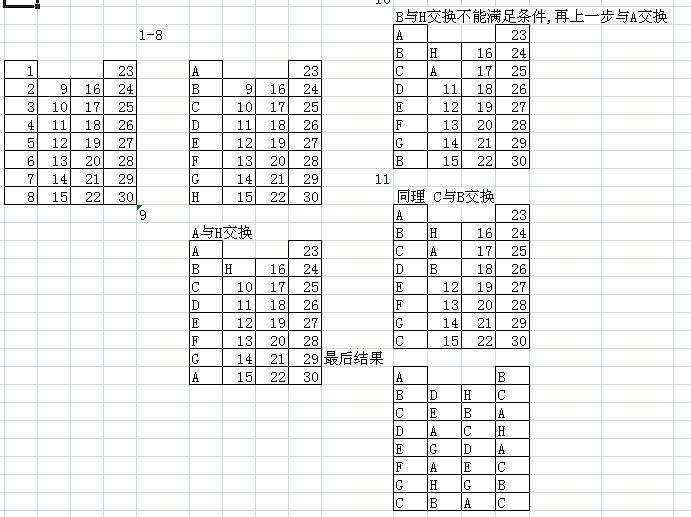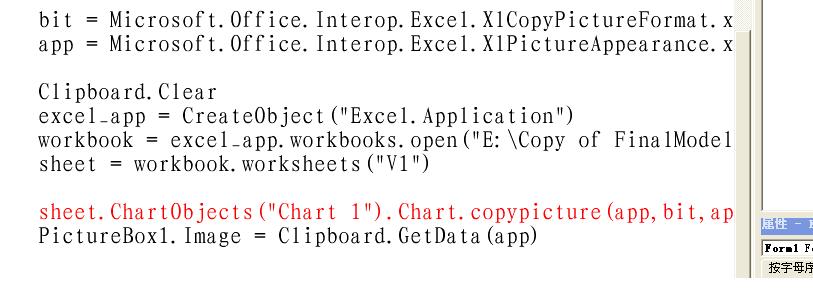求一段vb代码
如果提供1,2,3,4,5 这时 如果提供6 程序能给出所有求和可能。6=1+5
6=2+4
小弟水平很低,求教各位高手。 For循环选择判断嘛
那还有6=1+2+3呢。怎样循环多少次呢?原始数据也可能不止5个数,要是10个20个咋办,看似是个大工程啊。
很久之前看到过一段代码,没看懂,现在找不到了。
应该是有某个算法吧?
因为我不是很专业,更不是算法大玩,所以很头痛啊。不过这个功能对我现在的工作是真有用,如果有哪位高手知道,还请帮忙,非常感谢。 http://bbs.csdn.net/topics/390360329 版主的那个,跟楼主的需求好象不一样呢。
Option Explicit
Private aParam() As Long
Private aUsed() As Long
Private mValue As Long
Private mTemp As Long
Private mDatSUM As Long
Private Sub GetNum(ByVal nBase As Long)
Dim i&
For i = nBase To mDatSUM
If (aUsed(i) = 0) Then Exit For
Next
mTemp = mTemp + aParam(i)
aUsed(i) = 1: nBase = nBase + 1
If (mTemp >= mValue) Then Exit Sub
If (nBase >= mDatSUM) Then Exit Sub
Call GetNum(nBase)
End Sub
Private Sub Command1_Click()
Dim i&, j&, k&, sOut$
mDatSUM = 8
mValue = 10
'mDatSUM = 5 ' 5个数
'mValue = 6 ' 求和为6
ReDim aParam(mDatSUM), aUsed(mDatSUM)
For i = 1 To mDatSUM
aParam(i) = i
Next
' 要快递归速度,需要对aParam() 从小到大排序
For i = 1 To mDatSUM - 1
aUsed(i) = 1
For k = i + 1 To mDatSUM
mTemp = aParam(i)
For j = k To mDatSUM
aUsed(j) = 0
Next
Call GetNum(k)
If (mTemp = mValue) Then
sOut = mValue & " = "
For j = i To mDatSUM
If (aUsed(j) = 1) Then sOut = sOut & aParam(j) & "+"
Next
Me.Print Left$(sOut, Len(sOut) - 1)
End If
aUsed(k) = 0
Next
Next
End Sub
怎么就不一样了? 那个的,1个数可以使用多次。
这个的,每个数只用1次(一个组合中)。
那简单
x >= seed.LastOrDefault()
改成
x > seed.LastOrDefault()
即可。 我那个,好象也没枚举完。

过会儿有空再修改下。
这个应该完整枚举了。
Option Explicit
Private aParam() As Long
Private aUsed() As Long
Private mDatSUM As Long
Private mValue As Long
Private Sub GetNum(ByVal V&, ByVal nBase As Long, ByVal N As Long)
Dim i&, t&, sOut$
t = V - aParam(nBase)
If (t < 0) Then Exit Sub
If (N = 1) Then
If (t = 0) Then
aUsed(nBase) = 1
sOut = mValue & " = "
For i = 1 To nBase
If (aUsed(i) = 1) Then sOut = sOut & aParam(i) & " + "
Next
aUsed(nBase) = 0
Debug.Print Left$(sOut, Len(sOut) - 3)
Else
If (nBase < mDatSUM) Then
i = nBase + 1
Call GetNum(V, i, 1)
Call GetNum(V, i, 0)
End If
End If
Else
i = nBase + 1
If (i > mDatSUM) Then Exit Sub
aUsed(nBase) = 1
Call GetNum(t, i, 1)
Call GetNum(t, i, 0)
aUsed(nBase) = 0
End If
End Sub
Private Sub Command1_Click()
Dim i&, t&
mDatSUM = 15 ' 15个数(1~15)
mValue = 30 ' 和为30
'mDatSUM = 5 ' 5个数
'mValue = 6 ' 求和为6
ReDim aParam(mDatSUM), aUsed(mDatSUM)
For i = 1 To mDatSUM
aParam(i) = i
Next
' 必要对 aParam() 从小到大排序
For i = 1 To mDatSUM - 1
aUsed(i) = 1
t = mValue - aParam(i)
Call GetNum(t, i + 1, 1)
Call GetNum(t, i + 1, 0)
aUsed(i) = 0
Next
End Sub
using System;
using System.Collections.Generic;
using System.Linq;
using System.Text;
namespace ConsoleApplication1
{
class Program
{
static void Main(string[] args)
{
var result = OutPut(6, new int[] { 1, 2, 3, 4, 5 }, new List<int>());
foreach (var item in result)
Console.WriteLine(string.Join(",", item.Select(x => x.ToString())));
}
public static IEnumerable<List<int>> OutPut(int sum, int[] array, IEnumerable<int> seed)
{
if (seed.Sum() == sum)
yield return seed.ToList();
else
foreach (var item in array.Where(x => x > seed.LastOrDefault()).Select(x => seed.Concat(new int[] { x })).Where(x => x.Sum() <= sum).SelectMany(x => OutPut(sum, array, x)))
yield return item;
}
}
}
看看C#简单不简单。
1,2,3
1,5
2,4
Press any key to continue . . .
下面是1~15,sum=30的
using System;
using System.Collections.Generic;
using System.Linq;
using System.Text;
namespace ConsoleApplication1
{
class Program
{
static void Main(string[] args)
{
var result = OutPut(30, Enumerable.Range(1, 15).ToArray(), new List<int>());
foreach (var item in result)
Console.WriteLine(string.Join(",", item.Select(x => x.ToString())));
}
public static IEnumerable<List<int>> OutPut(int sum, int[] array, IEnumerable<int> seed)
{
if (seed.Sum() == sum)
yield return seed.ToList();
else
foreach (var item in array.Where(x => x > seed.LastOrDefault()).Select(x => seed.Concat(new int[] { x })).Where(x => x.Sum() <= sum).SelectMany(x => OutPut(sum, array, x)))
yield return item;
}
}
}
1,2,3,4,5,6,9
1,2,3,4,5,7,8
1,2,3,4,5,15
1,2,3,4,6,14
1,2,3,4,7,13
1,2,3,4,8,12
1,2,3,4,9,11
1,2,3,5,6,13
1,2,3,5,7,12
1,2,3,5,8,11
1,2,3,5,9,10
1,2,3,6,7,11
1,2,3,6,8,10
1,2,3,7,8,9
1,2,3,9,15
1,2,3,10,14
1,2,3,11,13
1,2,4,5,6,12
1,2,4,5,7,11
1,2,4,5,8,10
1,2,4,6,7,10
1,2,4,6,8,9
1,2,4,8,15
1,2,4,9,14
1,2,4,10,13
1,2,4,11,12
1,2,5,6,7,9
1,2,5,7,15
1,2,5,8,14
1,2,5,9,13
1,2,5,10,12
1,2,6,7,14
1,2,6,8,13
1,2,6,9,12
1,2,6,10,11
1,2,7,8,12
1,2,7,9,11
1,2,8,9,10
1,2,12,15
1,2,13,14
1,3,4,5,6,11
1,3,4,5,7,10
1,3,4,5,8,9
1,3,4,6,7,9
1,3,4,7,15
1,3,4,8,14
1,3,4,9,13
1,3,4,10,12
1,3,5,6,7,8
1,3,5,6,15
1,3,5,7,14
1,3,5,8,13
1,3,5,9,12
1,3,5,10,11
1,3,6,7,13
1,3,6,8,12
1,3,6,9,11
1,3,7,8,11
1,3,7,9,10
1,3,11,15
1,3,12,14
1,4,5,6,14
1,4,5,7,13
1,4,5,8,12
1,4,5,9,11
1,4,6,7,12
1,4,6,8,11
1,4,6,9,10
1,4,7,8,10
1,4,10,15
1,4,11,14
1,4,12,13
1,5,6,7,11
1,5,6,8,10
1,5,7,8,9
1,5,9,15
1,5,10,14
1,5,11,13
1,6,8,15
1,6,9,14
1,6,10,13
1,6,11,12
1,7,8,14
1,7,9,13
1,7,10,12
1,8,9,12
1,8,10,11
1,14,15
2,3,4,5,6,10
2,3,4,5,7,9
2,3,4,6,7,8
2,3,4,6,15
2,3,4,7,14
2,3,4,8,13
2,3,4,9,12
2,3,4,10,11
2,3,5,6,14
2,3,5,7,13
2,3,5,8,12
2,3,5,9,11
2,3,6,7,12
2,3,6,8,11
2,3,6,9,10
2,3,7,8,10
2,3,10,15
2,3,11,14
2,3,12,13
2,4,5,6,13
2,4,5,7,12
2,4,5,8,11
2,4,5,9,10
2,4,6,7,11
2,4,6,8,10
2,4,7,8,9
2,4,9,15
2,4,10,14
2,4,11,13
2,5,6,7,10
2,5,6,8,9
2,5,8,15
2,5,9,14
2,5,10,13
2,5,11,12
2,6,7,15
2,6,8,14
2,6,9,13
2,6,10,12
2,7,8,13
2,7,9,12
2,7,10,11
2,8,9,11
2,13,15
3,4,5,6,12
3,4,5,7,11
3,4,5,8,10
3,4,6,7,10
3,4,6,8,9
3,4,8,15
3,4,9,14
3,4,10,13
3,4,11,12
3,5,6,7,9
3,5,7,15
3,5,8,14
3,5,9,13
3,5,10,12
3,6,7,14
3,6,8,13
3,6,9,12
3,6,10,11
3,7,8,12
3,7,9,11
3,8,9,10
3,12,15
3,13,14
4,5,6,7,8
4,5,6,15
4,5,7,14
4,5,8,13
4,5,9,12
4,5,10,11
4,6,7,13
4,6,8,12
4,6,9,11
4,7,8,11
4,7,9,10
4,11,15
4,12,14
5,6,7,12
5,6,8,11
5,6,9,10
5,7,8,10
5,10,15
5,11,14
5,12,13
6,7,8,9
6,9,15
6,10,14
6,11,13
7,8,15
7,9,14
7,10,13
7,11,12
8,9,13
8,10,12
9,10,11
Press any key to continue . . . 看起来是简单。
但在VB6中,无法支持那种语法的,不能直接移植。
VB9开始支持。

补充:VB , 基础类




